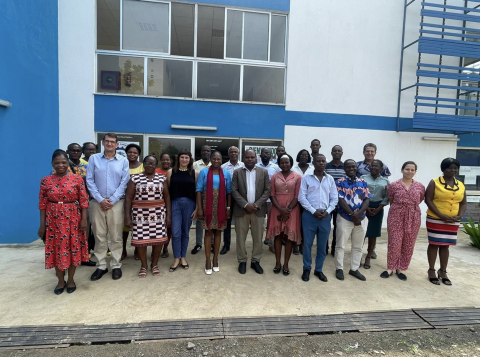São Tomé and Príncipe Makes Progress in Clean Cooking Policy for a Sustainable Future
São Tomé and Príncipe Makes Progress in Clean Cooking Policy for a Sustainable Future
São Tomé and Príncipe, February 1, 2024 –
To address the critical issue of access to clean cooking, Sao Tomé and Príncipe (STP) is making significant advancements in its clean cooking policy with UNIDOs support through the GCF funded project “Building institutional capacity for a Renewable Energy and Energy Eficiency investment programme for Sao Tome and Principe”.
According to recent data, seven in ten São Tomeans lack access to clean cooking, with traditional biomass, particularly wood and charcoal, being the primary sources of fuel. Approximately, 72% of the population utilizes solid fuels, with wood being the most prevalent at 45.6%, followed by charcoal (26.5%), petroleum (25.5%), and Liquefied Petroleum Gas (LPG) at a mere 1.5%.
Women and children bear the brunt of the adverse effects of traditional cooking methods due to social-cultural norms, which restrict them to household chores, like cooking. The consumption of forest biomass, particularly in the northern savannas of São Tomé, poses a threat to the environment, contributing to deforestation and greenhouse gas emissions.
STP has been working in collaboration with the UN Industrial Development Organization (UNIDO), Global Environment Facility (GEF), and Green Climate Fund (GCF) to transition towards more sustainable cooking models. Through the GEF-funded Strategic Program to Promote Renewable Energy and Energy Efficiency Investments in the Electricity Sector of Sao Tome and Principe, implemented by UNIDO in partnership with the Ministry of Public Works, Infrastructure, Natural Resources, and Environment (MOPIRNA) and ECOWAS Centre for Renewable Energy and Energy Efficiency (ECREEE), technical support has been provided for the development of the National Energy Efficiency Action Plan (PANEE) and the National Renewable Energy Action Plan (PANER). These plans have played a pivotal role in promoting a comprehensive vision of sustainable energy.
The PANER and PANEE aim to transform cooking practices by gradually replacing traditional stoves with efficient, high-performance stoves, and even exploring electricity and solar-powered solutions. The goals align directly with the Sustainable Development Goal SDG 7 - "Ensure access to affordable, reliable, sustainable, and modern energy for all."
Furthermore, collaborations between UNIDO and the Ministry of Public Works, Infrastructure, Natural Resources, and Environment (MOPIRNA) and the Ministry of Planning, Finance and Blue Economy (MPF) through the GCF funded project “Building institutional capacity for a RE/EE investment programme for Sao Tome and Principe” have encompassed extensive policy development and capacity-building initiatives to strengthen the country's resilience to climate change, with a specific focus on advancing clean cooking and enhancing energy efficiency.
Based on a study conducted by the Universidad Politécnica de Madrid, insights reflect that while kerosene stoves remain the most common cooking system in São Tomé and Príncipe, accounting for 43% of households, there has been a significant reduction compared to the 2018 study (53.5%), indicating a rapid transition to Liquefied Petroleum Gas (LPG), which has increased from 1.2% to 18.89%. Following kerosene and LPG, three-stone stoves are the next most widely used system, with low penetration of traditional and improved stoves, consistent with the 2018 study. Gender analysis reveals that households headed by women tend to use more non-clean cooking systems (biomass and kerosene) and fewer clean cooking systems (LPG and electricity).
Substantial differences also exist between rural and urban populations. In rural areas, wood and charcoal usage is at 53.7%, compared to 20.61% in urban environments. Conversely, LPG usage is 5.42% in rural areas compared to 32.99% in urban areas. Rural households headed by women use more wood and three-stone stoves and less kerosene, with no significant differences in LPG usage. In urban populations, households headed by women use more wood, charcoal, and kerosene stoves and less LPG. This indicates that households headed by women tend to use lower-tier technologies than those headed by men.
Although very few families regularly use electric stoves for cooking, electrical appliances are commonly used for some culinary tasks. A significant proportion of households possess kettles, microwave ovens, and toasters, while the availability of electric cookers and pressure cookers is minimal. The primary reason cited for not using electricity is the unstable power supply, particularly in households headed by women due to the use of time. Additionally, the cost is a significant deterrent to electricity usage, especially among households not connected to the grid. Overall, stacking or using multiple cooking technologies is common, with cost being the primary factor influencing the choice of cooking system for the majority of households.
Recommendations for advancing clean cooking policies include focusing on women-centered approaches, conducting awareness campaigns to highlight the benefits of clean cooking, implementing multi-technological strategies, and introducing policies that guarantee long-term sustainable access to electricity and clean cooking. The emphasis on affordability and awareness is crucial in encouraging people to shift to cleaner alternatives.
The transition to cleaner cooking methods is expected to reduce deforestation and contribute to better forest resource management. Introducing efficient stoves and awarness campain is seen as a viable solution, offering immediate benefits to rural families where a shift to clean fuels like LPG might be impractical due to cost or availability constraints.
STP's strides in clean cooking policy signify a commendable commitment to environmental sustainability, improved health, and a brighter future for its citizens. The ongoing collaborations and transformative initiatives reflect a strong dedication to achieving clean energy access for all by 2030, aligning with global sustainability goals.
For further information, please, contact:
Martin Lugmayr, Industrial Development Expert and GNSEC Coordinator: M.GAILLON@unido.org
Andrea Eras Almeida, Renewable Energy Project Expert: A.ERASALMEIDA@unido.org
Gabriel Maquengo, National Project Coordinator: G.LIMAMAQUENGO@unido.org
Geisel Carvalho de Menezes, National Young Climate Professional: G.CARVALHODEMENEZES@unido.org





